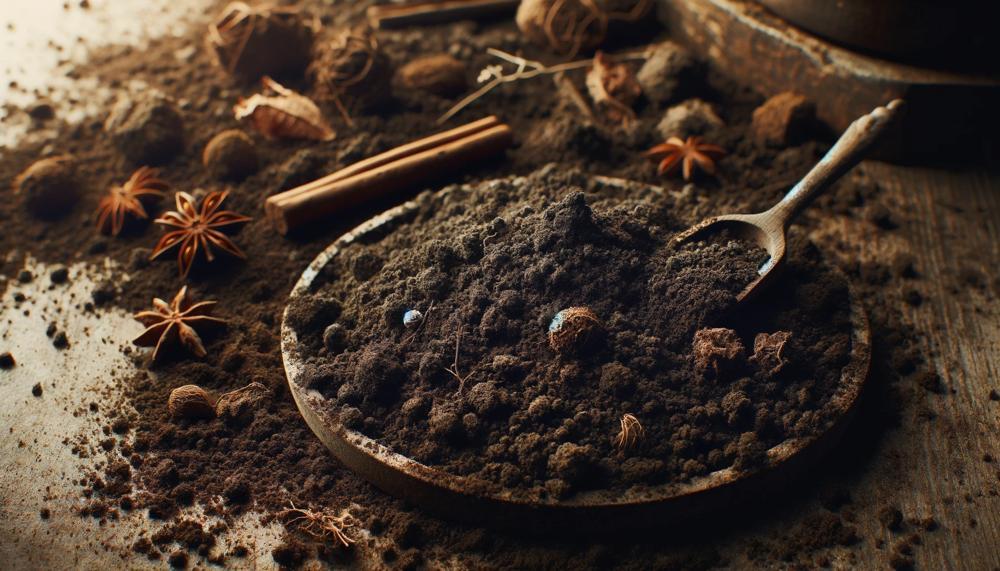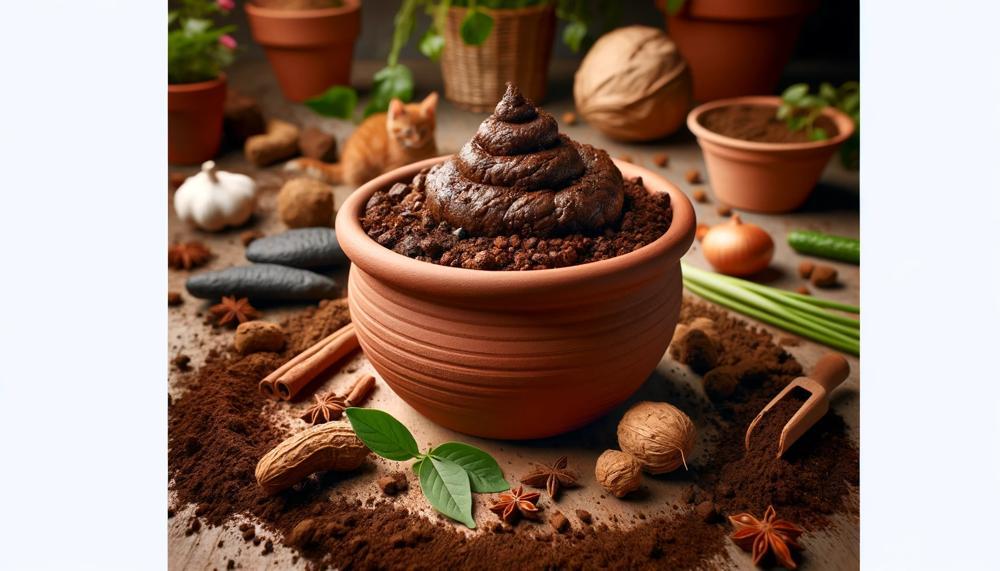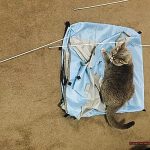Today, we’re tackling a not-so-pleasant topic: neutralizing cat feces in soil. While our furry companions bring us endless joy, their waste can cause some serious damage to our gardens if left unchecked.
So, how do you neutralize cat feces in soil?
Here are some ways to neutralize cat feces in soil:
- Vinegar: Spray a mixture of vinegar and warm water on plants or areas where cats poop. The acid in the vinegar neutralizes the urea in cat urine.
- Garden lime: This alkaline product neutralizes and absorbs the odor of cat urine.
- Citrus peels: Apply small pieces of citrus peel to the surface of the soil where cats are a problem. Cats don’t like the smell of citrus peels.
So put on your gardening gloves and join me as we explore some simple yet effective ways to keep your soil clean and your plants thriving.
How To Neutralize Cat Feces In Soil?
Contents
But fear not, because in this post, we will explore the question of “How To Neutralize Cat Feces In Soil?” and provide valuable information to help keep your outdoor space clean and safe for both humans and pets.
Why is it important to neutralize cat feces in soil?
Cat feces may seem harmless, but they can contain harmful bacteria, parasites, and viruses that can pose a health risk to humans and other animals. Not only that, but it can also attract pests and insects to your garden or yard, causing damage to plants and possibly spreading diseases.
Neutralizing cat feces is crucial for maintaining a safe and healthy environment for everyone.
Natural ways to neutralize cat feces in soil:
One effective method is composting. As the feces decompose, the harmful bacteria are broken down, making it safe for use in your garden. Another natural option is using vinegar, which has antimicrobial properties that can help kill bacteria.
Simply mix one part vinegar with three parts water and pour it over the affected area. Burying the feces deep in the ground is also a natural way to neutralize it.
Chemical options for neutralizing cat feces in soil:
If you prefer a more chemical approach, there are products available on the market specifically designed for neutralizing pet waste in soil. These products contain enzymes that break down the feces and eliminate any harmful bacteria.
However, be sure to carefully follow instructions and avoid using them near edible plants as they can be harmful to the environment.
Proper disposal of cat feces:
It is crucial to dispose of cat feces properly to prevent contamination of soil and water sources. Do not flush it down the toilet as it can cause clogs and pollute water systems.
Instead, seal the feces in a biodegradable bag and dispose of it in a trash bin or bury it deep in the ground away from any edible plants.
Preventing cats from using your garden as a litter box:
To prevent cats from using your garden as a litter box, you can use deterrents such as citrus peels, coffee grounds, or rosemary around the perimeter. Creating a designated area for your cat to do their business, such as a sandbox filled with sand or non-toxic soil, can also be effective.
Consistently cleaning and maintaining this area can help discourage cats from using other areas in your yard.
Final tips:
Regularly cleaning up after your cat and properly disposing of their feces can help prevent the buildup of harmful bacteria in your soil.
Potential Health Risks Associated with Cat Feces in Soil
Cats are adorable, cuddly, and make great companions. But as much as we love our feline friends, it’s important to be aware of the potential health risks associated with their feces in soil. As a cat owner, you may have noticed your furry friend leaving their business in the garden or yard. While it may seem harmless, there are actually several dangers that come with cat feces in soil.
Bacteria and Parasites:
Cat feces can contain harmful bacteria such as Salmonella, Campylobacter, and E. coli. These bacteria can cause food poisoning and other illnesses if ingested. Feces from outdoor cats can also contain parasites such as Toxoplasma gondii, which can cause toxoplasmosis in humans.
Toxoplasmosis can be especially dangerous for pregnant women, as it can cause birth defects in the unborn child.
Roundworms and Hookworms:
Aside from bacteria and parasites, cat feces in soil can also contain roundworms and hookworms.
These parasites can be transmitted through contact with contaminated soil. In humans, they can cause symptoms such as diarrhea, abdominal pain, and anemia.
Viruses:
If that wasn’t enough, cat feces can also carry viruses such as feline leukemia virus (FeLV) and feline immunodeficiency virus (FIV).
These viruses can be transmitted to other cats through exposure to contaminated soil.
Other Animals at Risk:
It’s not just humans who are at risk from cat feces in soil. Other animals that come into contact with the contaminated soil can also be affected by these health risks.
Precautions to Take:
Now that we know the potential dangers of cat feces in soil, it’s important to take precautions to prevent the spread of harmful bacteria and diseases. Here are some tips to help neutralize cat feces in soil:
- Wear gloves and a mask when handling cat feces to avoid direct contact and inhalation of any harmful bacteria or parasites.
- Dispose of cat feces properly by placing it in a sealed bag and throwing it in the trash.
- Avoid using cat feces as fertilizer in your garden or yard, as this can contaminate the soil.
- Clean and disinfect the area where the feces were found to eliminate any remaining bacteria or parasites.
Steps to Effectively Neutralize Cat Feces in Soil
As cat owners, we all know the joys of having a furry feline friend in our lives. However, it’s important to also be aware of the potential dangers that their feces can bring to our outdoor spaces.
Cat feces can contain harmful bacteria, parasites, and viruses that can pose a health risk to humans and other animals. That’s why it’s crucial to properly neutralize cat feces in soil to maintain a safe and healthy environment for everyone. In this blog post, we will explore the necessary steps for effectively neutralizing cat feces in soil.
Why is it Important to Neutralize Cat Feces in Soil?
Cat feces can contain a variety of harmful pathogens such as Toxoplasma gondii, Salmonella, and E. coli. When left in soil, these pathogens can easily spread to other animals and even humans through contact or ingestion.
This can lead to serious health issues such as diarrhea, vomiting, and even organ damage. By neutralizing cat feces in soil, we can prevent the spread of these harmful pathogens and protect the well-being of our loved ones.
Methods for Neutralizing Cat Feces in Soil
There are several methods that are commonly used to neutralize cat feces in soil. These include burying, composting, and using specialized products such as enzymatic cleaners or lime.
- Burying: One of the simplest methods is to bury the cat feces at least 6-8 inches deep in the ground. This allows the natural decomposition process to take place and reduces the risk of contamination. However, this method may not be as effective in colder climates where the ground may freeze.
- Composting: Another eco-friendly method is to compost the cat feces along with other organic materials such as leaves and grass clippings. This process helps break down the feces and turns it into a nutrient-rich soil amendment. However, it’s important to use a separate compost bin specifically for pet waste and not use the compost on any edible plants.
- Using specialized products: There are also products available on the market that are specifically designed to neutralize cat feces in soil. These products contain enzymes that break down the feces and eliminate any harmful bacteria. However, they can be more expensive and may not be as environmentally friendly.
Precautions to Take When Handling Cat Feces in Soil
Wear Protective Gear
The first and most important precaution to take when handling cat feces in soil is to wear protective gear. This includes gloves and a mask. Gloves will prevent direct contact with the feces, reducing the risk of transmission of harmful bacteria.
Make sure to use disposable gloves and dispose of them properly after use. A mask will also protect you from inhaling any airborne contaminants from the feces.
Wash Your Hands Thoroughly
After handling cat feces, it is crucial to wash your hands thoroughly with soap and water.
This will help remove any bacteria that may have come in contact with your skin. It is especially important for those with weakened immune systems or pregnant women to take this precaution.
Avoid Growing Edible Plants in Contaminated Soil
If you suspect there may be cat feces in your garden or vegetable patch, it is best to avoid growing edible plants in that area.
Cat feces can contain harmful pathogens that can contaminate your produce and cause foodborne illnesses.
Keep Children and Pets Away
Children and pets are more susceptible to contracting diseases from cat feces due to their lower immune systems.

It is important to keep them away from areas where cat feces may be present in the soil.
Properly Dispose of Cat Feces
It’s essential to dispose of cat feces properly. Flushing it down the toilet can contribute to water pollution, and leaving it in the garden can contaminate the soil and potentially harm plants. The best way to dispose of cat feces is by placing it in a tightly sealed bag and throwing it in the trash.
Clean Litter Boxes Regularly
If you use a litter box for your cat, make sure to clean it regularly and dispose of the waste properly. This will prevent any buildup of bacteria and reduce the risk of contamination in your home.
The Dangers of Using Chemicals to Neutralize Cat Feces
Environmental Impact
Chemicals like bleach and ammonia may be effective at killing bacteria and eliminating odor, but they can also harm the environment. When these chemicals are used in soil, they can seep into the ground and pollute water sources.
This not only affects the plants and animals living in the soil but also poses a threat to our own health.
Health Risks
Inhaling or coming into direct contact with these chemicals can cause irritation to the skin, eyes, and respiratory system. And even when properly diluted, these chemicals can still have harmful effects on the environment and should be used with caution.
Regular use of these chemicals can also lead to build-up in the soil, creating an unhealthy environment for plants and other organisms to thrive.
Ineffective Solution
While these chemicals may temporarily mask the odor of cat feces, they may not fully neutralize it. This means that you may end up using more and more chemicals without actually solving the problem.
In addition, these chemicals can also damage soil quality and affect the growth of beneficial microorganisms.
Safer Alternatives
Instead of relying on chemical solutions, there are safer and more environmentally-friendly alternatives for neutralizing cat feces in soil.
These include using natural products such as baking soda or vinegar, regularly cleaning litter boxes, and properly disposing of cat feces in sealed bags.
Responsible Pet Ownership and Waste Disposal Practices
As cat owners, we love our furry feline companions and want to provide them with the best care possible. This includes not only their health and happiness, but also being mindful of the impact our pets have on the environment.
One important aspect of responsible pet ownership is properly disposing of cat feces. In this blog post, we’ll discuss the potential risks associated with cat feces and the environmentally friendly methods for disposing of it.
The Dangers of Cat Feces
Did you know that cat feces can contain harmful parasites and bacteria? One such organism is Toxoplasma gondii, which can be transmitted to humans and other animals. These organisms can survive in soil for long periods of time and pose a threat to the ecosystem if not properly neutralized.
This is why it is crucial to dispose of cat feces in a responsible manner.
Responsible Disposal Methods
The most common method of disposing cat feces is by bagging it and throwing it in the trash. However, this contributes to overflowing landfills and the plastic bags used can take hundreds of years to decompose.
Luckily, there are more environmentally friendly options available.
Composting cat feces in a designated area in your backyard is another option. However, this should only be done if you do not use the compost on edible plants, as the feces may contain harmful pathogens. A better option is using a biodegradable litter made specifically for flushing or composting. These litters are usually made from natural materials, such as corn or wheat, and break down easily in water or soil.
For those who do not have access to a backyard or do not want to flush their cat’s waste down the toilet, some cities offer pet waste composting programs. Residents can drop off their bagged pet waste at designated locations for proper disposal. This is a great alternative that helps minimize the impact of cat feces on the soil.
Important Reminders
It is important to note that flushing cat feces down the toilet should only be done if your city’s sewage system can handle it. In some areas, flushing pet waste can lead to contamination of water bodies and harm aquatic life.
It is also crucial to always wash your hands thoroughly after handling cat feces and to regularly clean your cat’s litter box to prevent the buildup of harmful bacteria.
Conclusion
In conclusion, dealing with cat feces in soil can be a challenging and unpleasant task.
However, there are several effective methods to neutralize the odor and bacteria. From using natural remedies like vinegar or baking soda, to utilizing commercial products specifically designed for this purpose, there is a solution for every situation.
It is important to properly dispose of the waste and regularly clean the affected area to prevent any health hazards. With diligence and persistence, you can successfully eliminate cat feces from your soil and create a safe environment for yourself and your furry friends.
Remember to always follow safety precautions and consult a professional if needed.






